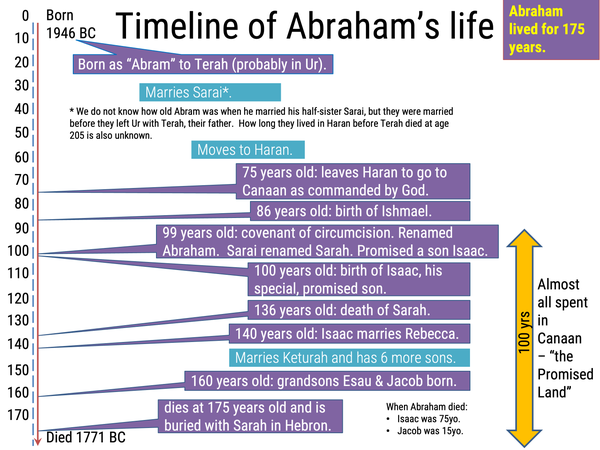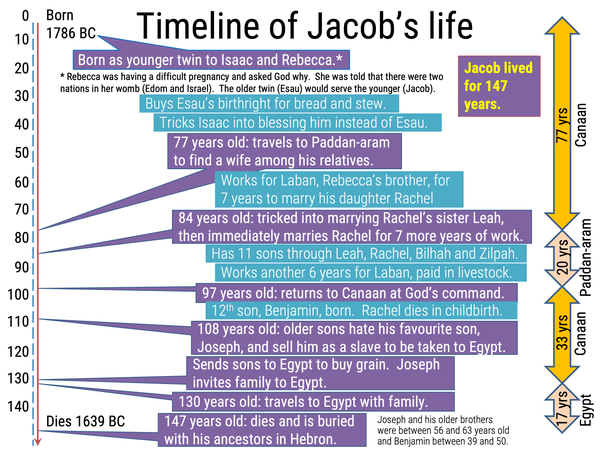|
The Bible Tales Online website presents a few simple timelines for the lives of various Bible characters. Timelines can help us visualise their lives in order and make their lives more real.
Some people in the Bible are more important than others. Minor characters are mentioned only once, their entire life presented in one word – their name. The lives of others, however, are described in more detail. A few are also referred to frequently in
the centuries that follow, their life being remembered as an example to later generations.
Abraham, Isaac and Jacob (also known as Israel) are unique examples in the Bible because they form a three-generation family line that started the nation of Israel, a nation still with us today – as God promised.
The Bible mentions Abraham, Isaac and Jacob together from the time of Joseph (Jacob’s son) through to the preaching of Jesus’ 12 apostles. Kings like David and Hezekiah and
prophets like Elijah and Jeremiah refer to them, showing just how important they were to God.
Three consecutive generations of God’s chosen men.
In this newsletter, we look at the lives of two of these men: Abram, whose name God changed to Abraham, and Jacob, whose name God changed to Israel. Whenever God changed people’s names, their new names that had a meaning in his plan for the world.
“Abraham” means “father of many nations” or “father of a multitude”,
presumably intended as a daily reminder to him (and Sarah) of God’s promises. It can still remind us of God’s faithfulness today.
“Jacob” means “supplanter”, a name he lived up to in taking his older brother Esau’s birthright and first-born’s blessing. However, when he fought with an angel as well, God gave him the name “Israel”, which means “one who struggles with God” or “God struggles” – both of which are very appropriate for the lives of both Jacob and the nation he
sired. Although Jacob was quick to acknowledge God as his God, he still struggled against God’s leadership on various occasions. Through history, while many Israeli individuals have walked with God, the nation as a whole has often struggled to even acknowledge him – his power to command, protect, guide and punish them. It seems that this is still the case today.
These two names – Abraham and Israel – are each long-term prophecies wrapped up in a single
word.
Abraham came from Ur of the Chaldees and went to Canaan (later named Israel) at the command of God. The land was called the Promised Land because of the promises God gave to Abraham when he obeyed. He was 75 when he arrived in Canaan and when he died, 95 years later, the only part of the land that he owned was a block he had bought in Hebron containing a cave in which he buried Sarah, his wife. God’s promise to give him the entire land was unfulfilled at his
death.
Not only so, but he was promised descendants like the sand of the seashore in number, yet when he died he had eight sons, and only one of them – Isaac – was the chosen son through who God’s promises would be fulfilled. True, Isaac also had twin sons by then (Esau and Jacob), but only one of them – Jacob – was chosen by God. It took another 60 years after Abraham’s death before his descendants through Isaac and Jacob began to multiply. Within seven years, Jacob
had 11 sons, with one more a few years later. The promise was beginning – finally – to be fulfilled. Yet by the end of Jacob’s life, the family was living in Egypt. There they would later be enslaved until the time of the Exodus, when they would leave Egypt as a nation numbered in the millions, to return to the Promised Land as God had said.
Some of God’s promises were being fulfilled, but the promise to Abraham and Jacob that they would possess the land themselves
(with their descendants) can only be fulfilled through resurrection at the return of Jesus.
These men not only wanted to be godly in life, but they had faith in God’s promises for the future as well. As Hebrews 11:13 puts it, “These all died in faith, not having received the things promised, but having seen them and greeted them from afar”.
|

